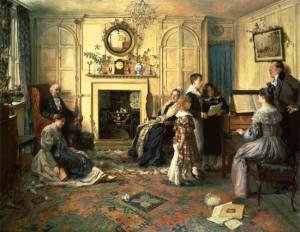Since the bulk of my summer reading has revolved around the early Victorian period, I have come across the idea of ‘Victorian Values’ a lot and thus it has forced me to reflect on their appeal in a time of terrorism, twitter trolls and a turbulent economy in the 21st Century.
When David Cameron became PM of the coalition in 2010, the white paper drafted shortly after expressed his desire to ”dismantle big government and build the big society in its place”. Many people understood this as a throwback to 19th Century civic culture that emphasised home-grown industry, laissez-faire and the promotion of self-reliance. This perhaps over-ambitious nostalgia caused controversy among many critics who argued it was simply not possible, and even dangerous to look to the past in order to solve a list of growing problems. However, what is interesting is why people are obsessed with the era enough to want the return of many of its characteristics.
Dynamic, self-confident, enterprising and idealistic. These are but a few words to describe the values held by the Victorians. A period of rapid change and the discovery of new technologies; most notably the development of the railways and the promotion of British industries such as textiles, wool, and coal contributed to the idea of individual prestige and self-dependency. One need only look to Samuel Smiles’ Self-Help (1845) which stressed the power of knowledge to increase an individual’s chances for of improving their social situation. Take for example Brunel, undoubtedly providing an inspiration for many because of his accomplishments in building the Great Western Railway, a series of steamships and important bridges and tunnels.
While it is unlikely that anyone would write a book similar to Self-Help today, if they did nobody would read it. Maybe people are looking to the past because of the evident lack of desire and bleak prospect of available opportunities to be innovative. Whilst this is not the case for many, it is easy to see why people revel upon Victorian achievements at a time when youth unemployment currently stands at just under 1 million people. Despite the dark side of child labour in factories during the period, it would be difficult to find a child not occupied in at least some kind of work.
And what of family life in the 21st Century? As much as we would love to live up to the Mary Berry ideal by indulging in home baking everyday, the stress of work or study means it has become a rarity for many people. Yet, we clearly hold these ideals dear. One need only walk into Cath Kidston with their floral aprons and quintessential baking wares to get the feel that there has been an ever-increasing market for nurturing home activities. This is something I personally enjoy; the look of utter delight on the faces of my friends and family when I present to them my special summer strawberries and cream cake. For those Victorian women not employed outside of the domestic sphere, this was their daily life. Not only that, but their soul purpose and worth.
Much emphasis was placed on mothers as the primary providers of nurture to their children in the private sphere when the idea of them becoming more active in public was a heated argument. Mrs Beeton’s Book of Household Management (1861) became one of the most famous cookery books of the time and instructed on how to cater for the ‘ideal family’. The painting ‘Home Sweet Home’ by W. D. Sadler (shown below) sums this up perfectly.
Queen Victoria and Albert most certainly adhered to the values of home and family life and people looked up to the ways in which they engaged with their young family. Arguably, the monarchy as an influencing factor in how people lived their lives is reflected in society today, with the recent birth of Prince George to the Duke and Duchess of Cambridge and the related celebrations and festivities.
So, what does this tell us about the 21st Century? In my view, the Victorians got it so right. They seemed to have a lot more passion and zeal, as shown for instance in the pressure on government for reform which resulted in the 1832 Great Reform Act. Never in my lifetime have I experienced a political protest as successful as this. Oh, unless you count the recent riots against University tuition fees and the £27,000 of debt slowly building up reminds me of just how successful that one was!

One thought on “Victorian Values: What’s The Obsession?”